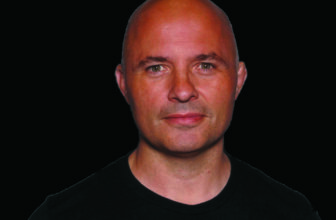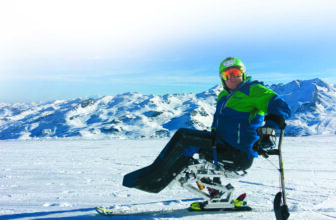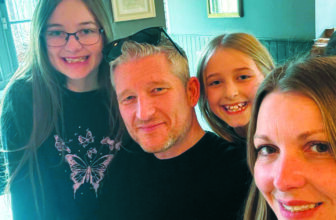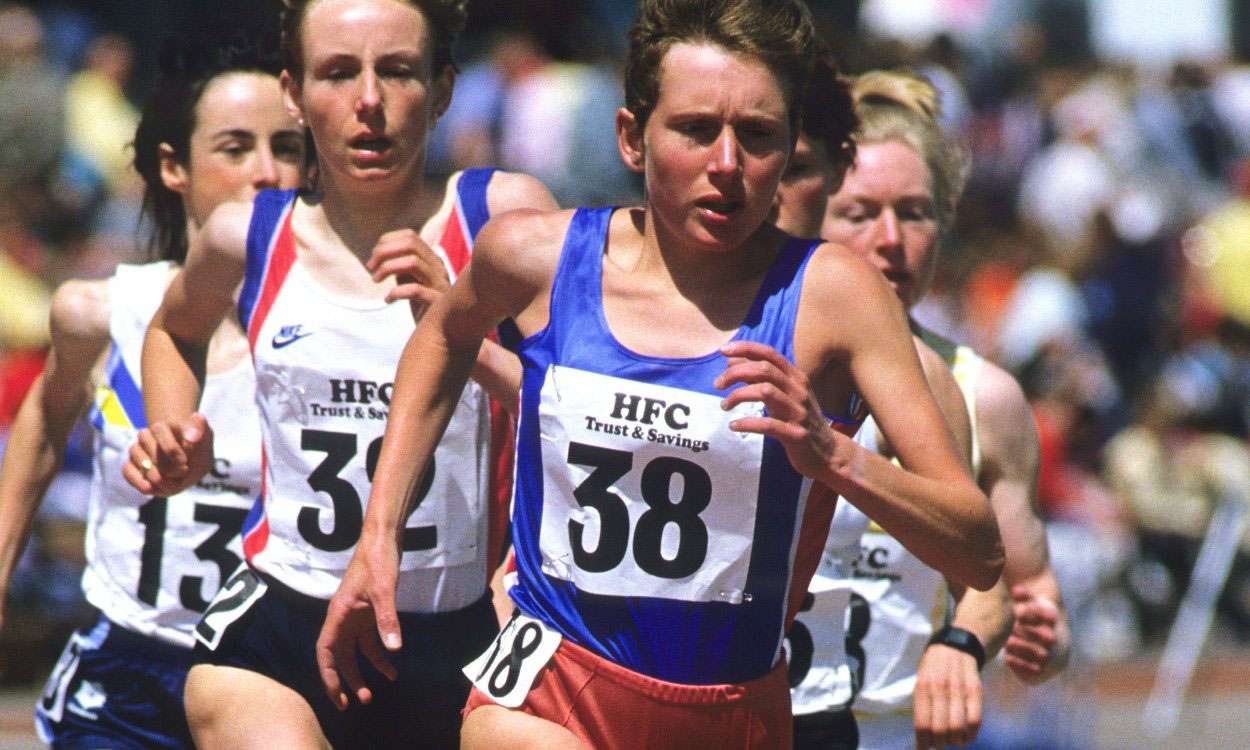
Me running in my amateur days as Susan Tooby
SUSAN: I was born and brought up in a little village called Woolhope, in Herefordshire, which is a small, rural community, smaller than Rudgwick, where I live now. I’m one of four children. I have an identical twin, Angela and two brothers. My parents divorced when we were very young and we lived with our father. We were very sporty at school but I wouldn’t say our family was particularly interested in sport. We were practical children, always very active.
I have good, happy memories of my childhood, we had lots of fun and freedom. The days when we helped with apple picking stand out in my mind. Even though my father was from a farming background and had land, he wasn’t actually a farmer himself, he worked in nearby Hereford. We were involved in local village activities, learning to bell ring in the local village church and that kind of thing.
We were quite academic and I loved school. My favourite subjects were history and sport. I attended school in Hereford, the Bishop’s School, which was a church school though during the time we attended, it became a comprehensive school and was renamed the Bishop of Hereford’s Blue Coat School. When I left school I went to Bangor university and went onto Loughborough university to do my PGCE and later to Bristol to complete a Masters degree.
Running with my twin sister Angela (no. 30)
I studied PE at university with history as a second subject. On reflection I think it was tutors’ influence at school and university that encouraged me to go into teaching, my twin sister also became a teacher. It was one of those careers offered if you weren’t highly academic but wanted to do something professional. I enjoyed sport and I enjoyed working with children so it was an obvious career progression. When I qualified my first job was at a school in Manglesfield, Bristol and I lived in Chepstow.
At that time Angela and I were training with a coach who lived in Cwmbran. We weren’t running as amateurs or professionals, it wasn’t like that in athletics at that time. You were an amateur simply because the money you earnt went into an account and it was used for things like living, training or whatever. While in the amateur ranks we would get paid if we won a race. The money went into a trust fund, as it was called, and like today, the ways in which you could earn money was to win races, receive appearance money or get it as a perk from your kit sponsor.
I was never a full-time athlete, it was difficult to become a full-time athlete then. In our early days, in the 80s there was money to be earnt in America, because there were no Ethiopian or Kenyan athletes competing and the Brits were quite strong. We really only hit the scene in the 80s when I was in my mid 20s, so I didn’t have any of the experience my son Jake now has on the track, our speed was nil. To enter into athletics at that time, we had to run 3000m, 5000m and 10,000m because we didn’t have the basic speed to be able to compete in the 1500m, it was hard. Whereas Jake, who started running seriously at school level, has gradually developed his speed which just goes to show it’s not all in the genes, he’s progressed through a steady grounding.
Me running in the Marathon at the Seoul Olympics
When I initially decided to race competitively I was living in Chepstow. My sister moved in to share my home in Bristol and we used to train together in Olveston. Because we’d lived in Wales when we were at uni from 1979-82 and trained there for over three years, we were eligible to run for Wales. So actually Wales was the first country we represented. The Commonwealth Games in Edinburgh was our first championships in 1986 and we both competed for Wales in the 10,000m. Angela got Bronze and I came sixth. I was always after my sister! Angela was always the strongest runner. It was only in 1988 when I realised I wasn’t going to be placed in the 1988 Olympics for the 10,000m because I was ranked 4th, that I decided to move up to run the Marathon. Otherwise I wasn’t going!
My debut was the Hereford Marathon when I was 21 and I ran 3:10 hrs without doing a lot of mileage. The London Marathon in 1988 was my first real challenge and I came 4th overall in the womens and I was the 2nd Brit which gave me automatic selection for the Olympics in Seoul. My sister qualified for the 10,000m. It was all a gamble. At the time I held the British record for the half Marathon because I was a good 10,000m runner and had upped my mileage for the marathon. I was the first woman in Britain to break 70 mins for the half Marathon but there are now 13 people who have ran faster than me. It was there to be broken.
Fast forward to 1990 and the Auckland Commonwealth Games. I had been selected for Wales for the Marathon. My sister was selected for the 10,000m for Wales. It coincided with my father’s 60th so we paid for him to go to Australia where the holding camp was situated, and then onto Auckland. Two weeks before we were due to fly I had a stress fracture so I had to pull out which was devastating. But rather than not go, to keep my father company, I got a flight and ended up there, spending time with my dad and watching Angela. Geoff (who became my husband) had been selected for the Marathon for England. While I was spectating the races with my father, I met his parents and sister who were there watching him. The two families socialised together and he met my father and sister. Some months after we returned home we moved up to Edinburgh and spent a year there together. He did his MBA which gave him another string to his bow as a qualified solicitor.
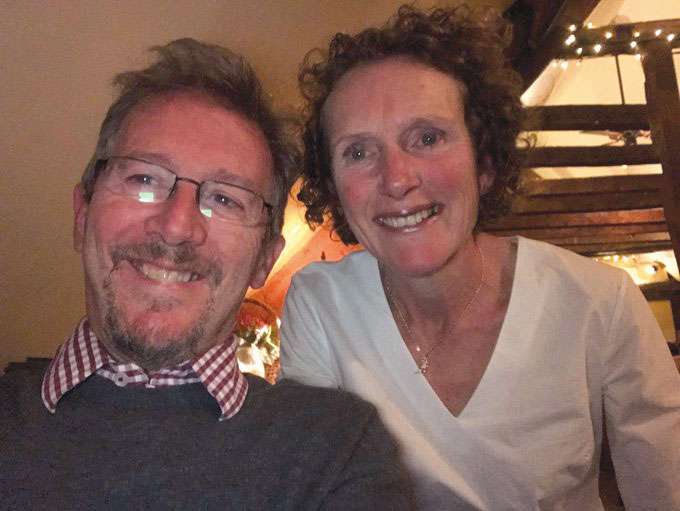
Geoff and I celebrating our 27th Wedding Anniversary in 2018
Our friendship flourished and Geoff did the Commonwealth games and then the European championships, in Split, in 1990, running the Marathon. I ran the Marathon for Britain in the European championships the same year. I ran terribly but Geoff finished a superb sixth. We got engaged in Split, in Yugoslavia. We married in Woolhope in 1991.
I absolutely loved my running, I felt it gave me my freedom. You’re in control of your body and in my younger years it gave me a purpose to race, to compete and compete well. But nowadays my running has a different emphasis. Firstly I run for health and fitness reasons and secondly for mental well-being because I feel so much better when I run and it’s good thinking time for me, as I run I can sort my brain. Even though I’m not a stressful person it helps me cope with tricky or anxious situations.
Running is an excellent sport to pursue because it’s the one sport you can do alone. You don’t need anyone else to run with, it’s quite cheap and while you’re out running you can appreciate the countryside and your environment. It doesn’t matter if you live in a built up city or the countryside, you can still appreciate the environment around you. When we go on holiday, I always run in the surrounding area so I can maximise my experience of the city or the area we’re visiting.

Geoff, our daughter Martha, me, Jake and Sam
One of my last races was the Berlin Marathon, two weeks before we got married in 1991. Looking back now, Geoff and I must have looked like two sticks going up the aisle – Geoff must have weighed about 9 ½ stone and myself 7 ½ stone. I retired from competitive running before we began our family in 1994. We have two sons and one daughter, Jake, Sam and Martha. I’ve always run even when the children were little. Geoff and I managed to juggle things so that I always had ‘my time’ even if it was just half an hour in the morning to go for a run. When I hear people saying there’s no time to exercise I find it hard to believe. If you love something, you’ll find the time to do it.
While I’m out running it’s an ideal time to “switch off” from everyday worries and it gives me the opportunity to think deeply and to think about loved ones that have passed away. I’m not one to shout out about what I believe in as it’s quite personal to me. But I do have a connection with my faith and the environment, I think they go hand in hand. As you get older there’s a tendency to worry about things more and running is good for relaxing. And also as you age, you lose your agility and your speed, you can lose everything if you’re not careful! It’s quite nice to maintain a level of fitness. I retired from teaching last year and felt I needed to keep up with the kids. It’s no good them wanting you to join in with activities and saying you can’t because you can’t move!
I retired from competitive running when I was 30. I felt at that age it was about the right time if I wanted to have a family. I don’t regret retiring when I did but, I would have liked to have broken 2hr 30 mins which is a bit of a landmark. I ran 2:31.33 and I really think if I had ran that distance for a few more years, I would have achieved that! It’s not a deep regret but it would have been interesting to see if I could have achieved that goal.

While I was teaching I taught History and PE. I’ve taught in a good number of schools, probably about 20 in all. I’ve experienced all facets of various schools and that’s why I’ve started coaching this year, at Horsham. I decided when I retired from teaching I would put something back into athletics because as a family, we’ve all benefitted so much from it.
My sons Jake and Samuel were encouraged to run by Catherine Edwards, at Park Mead school who was passionate about running. Jake was quite good even at school level and he’s one of those people that if he discovers something he’s good at, he feeds off it. He won most of his races at Park Mead. They had a good team there. Sam was a good runner but he was like me, he was always the one behind his brother. Sam just took a different pathway. He still runs and he’s a good runner. He has ran the London Marathon twice but just can’t commit himself in the same way Jake has and he hasn’t particularly wanted to. It’s a big commitment when it’s your job.
When we lived in Edinburgh from 2004 -13 I taught at Fettes and the children attended the school. They were part of the cross country and athletic club with regular training sessions. It was marvellous when the three Wightmans were in the cross country and athletic club and it was even more special as I coached them. I keep reminding Geoff about that who’s coached Jake for the last five or six years. You never have to ask Jake twice to train, he’ll always be there, on the button! He is passionate about his running and always has been.
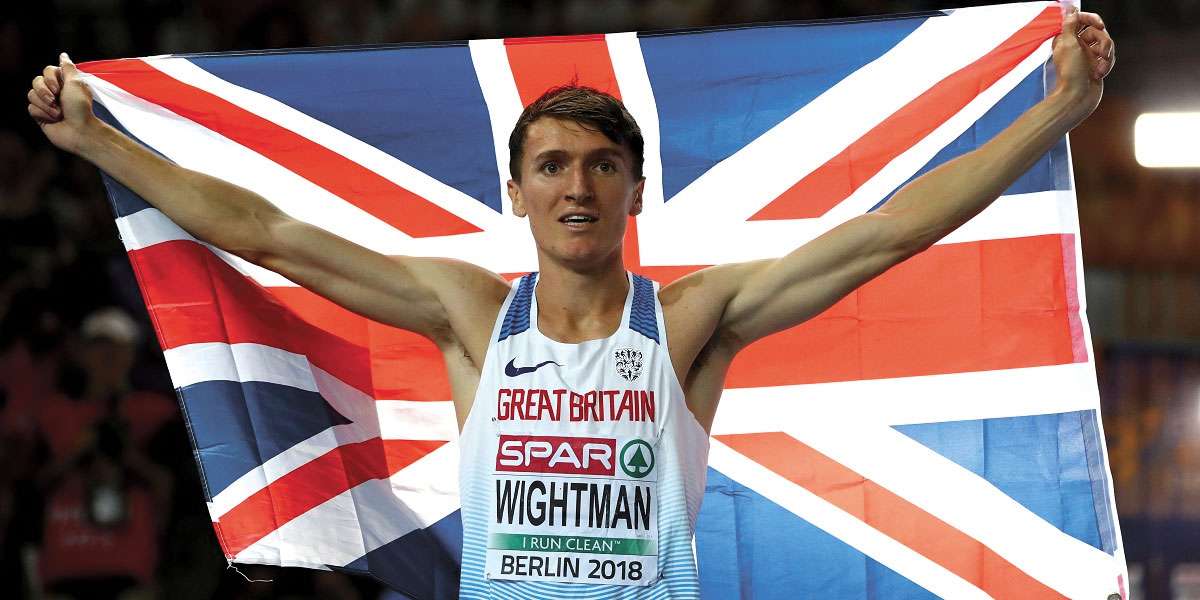
Running and winning for your country is the best feeling of all. European Championship 1,500m bronze in Berlin 2018
JAKE: My parents didn’t push us into running, I can’t recall a time when I didn’t want to run. Mum’s always ran every day. Dad’s always ran every day so we were surrounded by it, it was part of our family life. We went to watch athletics meetings throughout our childhood. In the same way some kids fall in love with football and want to be a footballer, my brother and I wanted to be runners when we grew up. I think genetically we had a bit of an advantage having two parents that ran. I was a competitive kid in primary school. I guess it was in my nature. When I’d been lucky and had a bit of success, I realised I liked winning and doing well.
We started running at Park Mead school. There were a few teachers who organised a cross country club. The first was a guy called Russell Withers and then Catherine Edwards followed on after him. She would take us to the Cross Country league over at Tillingbourne and I ran the Surrey Schools cross country and was given a Surrey Schools vest when I was in year five, the first time I ran for Surrey schools. Looking back on it now, having gone to a higher level, it’s obviously not a big deal but at the time it was something I was pretty proud of. I was young for my age group when I got it and got into the Southern Schools team on the back of it and raced against boys who were two years older than me.
I was at Park Mead school until we moved up to Edinburgh when I was about ten. I lived in Edinburgh from the age of 10 until 18, when I went to Loughborough uni. At the first school we attended there was a cross country coach called Carol Sharp. She knew my parents when they competed and she put us into the cross country teams without us having to prove ourselves. Once again I managed to have some success at Scottish Schools level. We then went to Fettes where Mum was a PE teacher and used to take the cross country club. It was the best environment knowing the coach at school knew how to develop a kid to have long-term success, not just be good at school level. It’s a big concern in athletics not to over-train at a young age. The ‘pond’ at school I would say was full of big kids who had trained a lot harder than they probably should have. Whereas mum and dad never pushed us too much to be successful at a young age. It’s more important to be successful as an adult. It’s about being patient about your development. It’s very easy to have burn out if you do too much, too early.
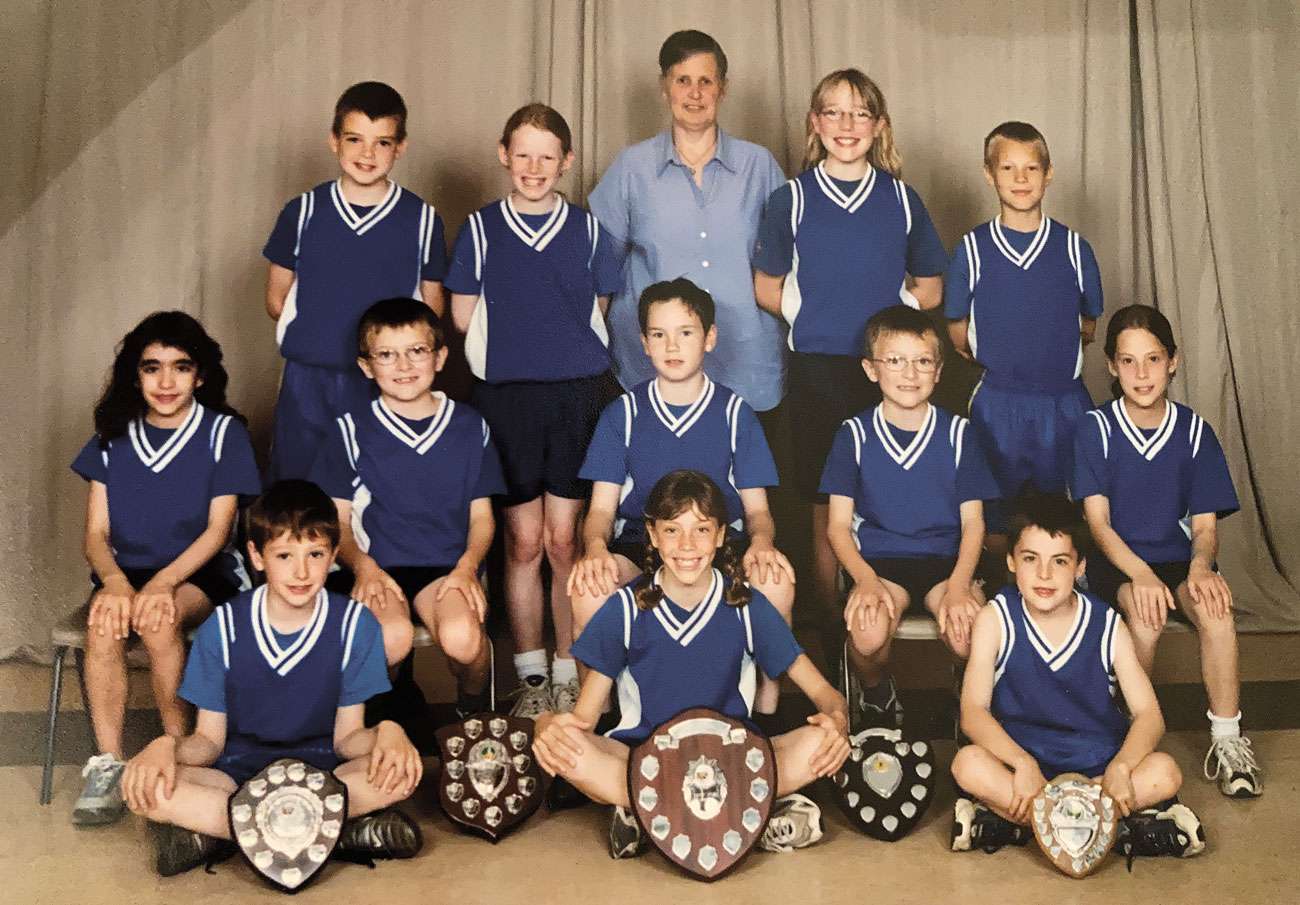
Middle Row: 2nd Sam and 4th is Jake at Park Mead
Even when we lived in Cranleigh, I loved the sport so much that if someone had asked me what my dream job would be, I’d have said to be a runner. However, I certainly didn’t understand how hard it is to ‘make it’. Because Mum had gone to the Olympics, I had a false sense and thought that as my parents were international athletes that I could choose to do it and succeed. But I’ve found the opposite. These sports are hard. Athletics is not a skill, it’s physical and it’s about how willing you are to be uncomfortable. When you race it’s about who can get the most out of himself and be better than the others. It’s not like a football match where one moment of brilliance wins the game. It’s the years of learning and developing that win races and the months building up to that moment. It’s a purely physical event rather than any skill.
I took Business Studies at uni and was able to train at Loughborough alongside my learning. It was the perfect environment to take my running to a higher level. While at Loughborough I trained twice a day and focused on running, with no other sports. I had enough success in my first year to be given a Nike contract which was the stepping stone towards becoming a professional. Once you’re earning money from a sport it’s a promising indication you can make a career from it. However, I knew I’d have to complete my degree because this sport doesn’t last forever. I’m going to have to get a job at some point so getting a degree was very important. I went to a uni that was academic enough to make me work hard for my degree and work hard to run at the same time so I learnt about balancing the two, and good time-management during those times.
This year I ran in the Tokyo Olympic men’s 1500m final but it was a long road to get there. Each year is about making small improvements to develop and build up more mileage. I believed the older you are the more mature you become mentally but that takes training too. Especially at top level everyone is physically pretty similar so mentally you’ve got to be strong to be better than others and you’ve got to have a lot of self-belief. If you’ve got self-doubt and don’t have confidence you won’t do anything. You’ve got to stand on the startline and believe that you’re going to win a race because that’s the only way you will.
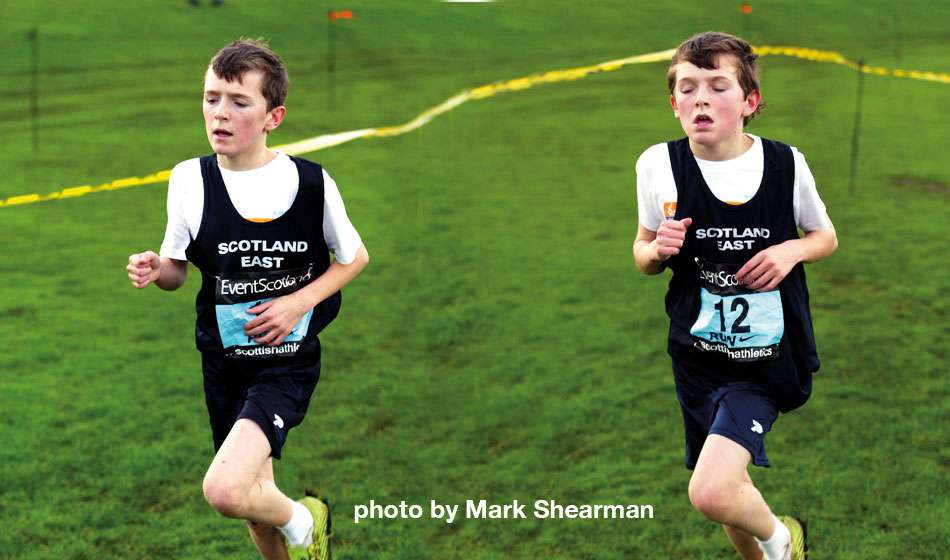
Jake and Sam competing in Scotland
At uni I had to make the decision to stop socialising so much with my friends. When they were going out for the night, I would just go to the start of the drinks at someone’s house for example and not drink and then I’d go home when they went off to the clubs. It was important because if I hadn’t made a decision to do that, I wouldn’t have progressed. When someone’s paying you to run you have to flip your mindset and make sacrifices. Since I was about 19, people have been investing in me and therefore you have to do everything you can to make that worthwhile.
The main two sources of income in athletics in the UK is foremost by far, your sponsors. So if there’s a shoe brand that will sponsor you, you train in their kit. You can only wear their kit and you race in their kit. If you go to the Olympics or world championships you wear their spikes. Other resources are from the lottery. In the UK, everyone who plays the lottery gives money to UK sport. I don’t know if people realise that? Then UK sport allocates it to different sports and Athletics UK choose about 50 people to distribute the funds to. There are different tiers of funding depending on how well you’ve done. So the decision to be sponsored and funded is about how much potential you’ve got.
When an athlete goes to the Olympics the team funds pay for everything but you don’t earn money from the Olympics, you earn ‘bonuses’ from your sponsor. You are representing them by wearing their spikes. It’s an honour to take part in the Olympics or in any international team like the World Championships, the Europeans and the Commonwealth Games. You won’t get paid for doing it, its just that’s where the biggest market is for your sponsors to invest in you to perform at those championships.
Jake winning the New Balance Fifth Avenue Mile in New York 2021
The Tokyo Olympics was a very different experience for athletes because there was no crowd spectating. Usually there are stands of people watching and it’s easy to become nervous and full of self-doubt. The thing to do is block that out with as many positive thoughts as possible. The Tokyo stadium had music playing and Dad was a stadium announcer so I could hear him which was encouraging. The hardest thing without a crowd was to remind myself of the importance of the race. It was still an Olympic final, there were still Olympic medals up for grabs. I’ve learnt the older I get the best thing to do is to relax as much as possible, because the more you worry about who’s watching you at home or how you’re going to do, the more energy you burn. The way I put things in perspective is to think that the racing is the easy bit. The training is hard and the training sessions are a lot harder than the races. The races are the reward for all the hard work you’ve put in the whole year. That really helps as you stand on the start line for a race, it’s the chance to show how hard you’ve worked.
Unfortunately my Olympic final wasn’t good. It was the worst race I had for a long time. I won a bronze in the 1500m in the Commonwealth Games in the Gold Coast and also at the European Championships in Berlin in 2018, and came fifth in the World Championships in Doha in 2019 so I have had quite a lot of experience running at that level. The way I want the races to be is slow and to finish quick. I run 800m as well as 1500m. When you’re against guys who are 5k and 1500m runners, they like a fast pace throughout and there’s a lot more of those runners now. There are three rounds so you are racing about three times within a few days. You have to be strong enough aerobically to get through that which I realised I wasn’t.
A few years back the races were run differently, they were a lot slower and I was better in those races. It’s moved on now and I need to get better in a different way. The one thing to do when you run badly is to learn what you need to do to improve. It was disappointing because you only get an Olympic final every four years so you might only get one or two, I might not have another one. That’s what is gutting, it was such a good opportunity. I ran very well in the other rounds so I still feel I was good enough to get a medal on that day, I just wasn’t quite right for that race on that day.

The pressure of thinking your race as well as running it is always on your shoulder to get it right on the day
Another British athlete Josh Kerr was in the same race and he got the Bronze medal. In the build up to the final, it was assumed one of us would get a medal, so I’m pleased Josh achieved that – he ran incredibly well. The winner was the Norweigan, Jakob Ingebrigtsen and he’s changed the way the event is run. He’s the world class 5000m and 1500m runner and he’s very good at getting through the rounds and maintaining strength throughout all of them. I need to aim towards that to be able to race against him better in future. Individual people can change events and the way they’re run.
It’s hard to explain the different training techniques for different distance races. You prepare differently for each event but no event is easier than another. You use different fuel systems. When you train for a longer event like the 1500m, you do longer reps at a slower pace but the volume is more which is hard. Whereas for a faster race like 800m you do shorter reps which is intense. One is aerobic and the other is anaerobic. One race gets your lungs and the other gets your legs that’s how I would explain it!
Recently Emma Raducanu has become an emblem for all UK tennis fans. There maybe some young runners now competing at Cranleigh schools level and my tip for them is to do it for enjoyment, not with the sole aim of being the best ever. Enjoy being competitive and relish any success you have, at any age. Don’t compare yourself to anyone else because everyone has a different pathway through sport. It’s not where you are right now but where you want to end up and that might take longer for one person than another. Just because Emma Raducanu is US Open Champion at age 18 doesn’t mean that somebody else can’t be US Open Champion a lot later but have a much steadier development to get there.
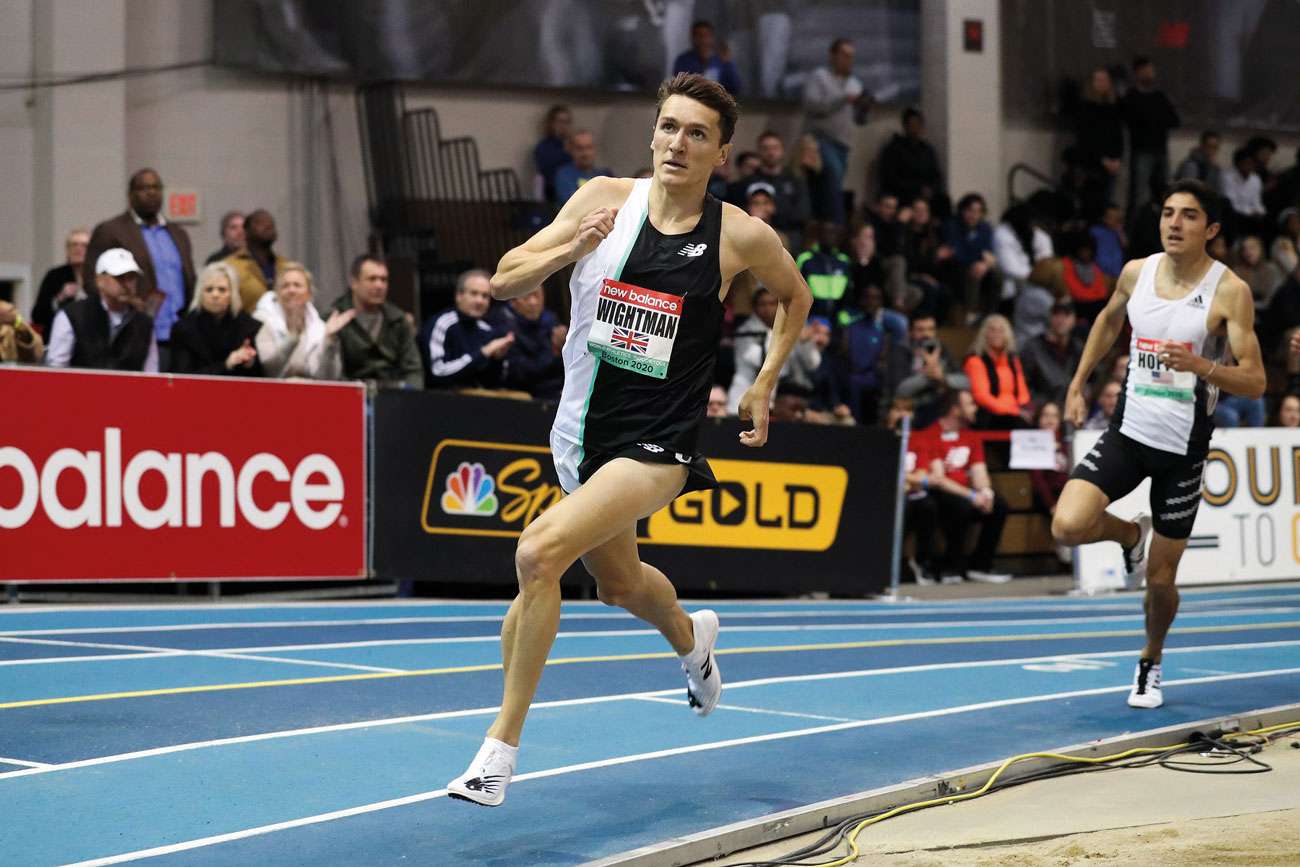
Timimg is everything when you make your move off that final bend
To be a good athlete you’ve got to be comfortable with being uncomfortable. You’ve got to be willing to put yourself through not very nice places to get better. Mentally there’s a lot of pressure especially as an individual sports person you have to develop your own self-confidence and be very good at self-motivating because no one else will pull you out and take you for a run on a grim, wet morning. You’ve got to be motivated enough to do it yourself and be committed to it. Don’t start taking short cuts and missing certain aspects of training otherwise that sets a precedent and you won’t see any improvement.
I love what I’m doing at the moment but at the same time once I finish competing it’ll be a relief from the expectations and pressures. There’s definitely things I will miss but then I’ll be able to go out for drink with my friends or go on a summer holiday! In the immediate future the Olympic cycle is definitely motivating me. Running is about fulfilling what you believe you can do. I still feel I’m improving and there’s more to come. I’d say every single athlete, is never satisfied with how they perform, they always want more. It’s the nature of sport.







